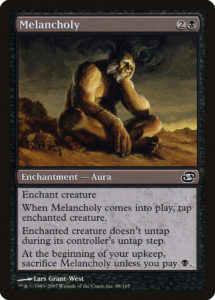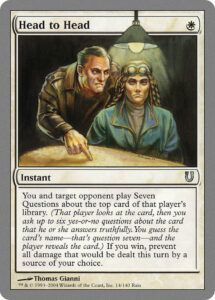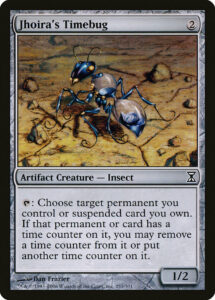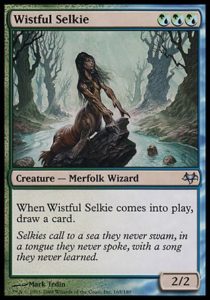Magic is a game in constant flux. Every year since its creation, Magic has introduced new sets, mechanics, rules, and ways to play. Arabian Nights, Unglued, Championship Decks, and the Pro Tour were all novel once upon a time. Magic today continues to experiment with more products, for a vastly bigger audience, faster, and amidst one of the most disruptive events in the past century.
Last week, Magic announced that one of these experiments would be coming to an end. After twenty five years, Organized Play is hitting pause.
Change is Hard
It took me some time to understand why this announcement hurt. It’s not like I ever wanted to become a professional player—all I ever wanted was to play a PT, and I managed to do that right before the pandemic started. Possibly at the last PT ever. It’s not as though I disagree with getting rid of the MPL—for all its good intentions, the program seems to have satisfied neither the pros, the aspiring pros, nor the fans. It didn’t lead to a boom in Magic eSports. No, the announcement saddened me by what it implied.
Magic wants tabletop Magic
It is wonderful knowing that Magic wants to go back to running big tabletop events. Magic has shifted away from featuring them exclusively at the competitive level due to Arena being a user-friendly platform with strong visuals. The pandemic necessitated shifting to 100% online play. I’d been concerned that Wizards might refrain from ever bringing back MagicFests and keep play online, where it doesn’t require event space, staff, judges, or vendors. Knowing that The Gathering matters to Wizards just as it matters to so many players is heartwarming—but there’s a catch.
The bitter truth is that massive tabletop events take time to put together. With the pandemic still raging throughout the world and smoldering in places like the US and UK, the logistics are impossible to nail down. Imagine trying to safely run an indoor event for thousands of people from across the world in close physical proximity for days at a time. If we have to wait until 2023 for our first big tournament, even if it’s a January release weekend event like the previously annual Grand Prix New Jersey—well, that’s farther from today than Players Tour Phoenix was in February 2020. That is a painfully long time to wait.
Waiting to wait more
We’ve gotten some great Limited formats throughout the pandemic, but the experience of all-digital Magic is nowhere near as enjoyable or engrossing for me as mixing digital and tabletop Magic. The announcement forced me to acknowledge how long it’s going to be until I get something resembling the Grands Prix that I loved. Arena Opens simply don’t scratch my competitive itch—I care about competing against human beings, not faceless avatars. I care about winning prestige more than cash. I play Sealed so that I can draft on day two, not play more Sealed. I enjoy the camaraderie of traveling with friends and seeing faces I only see at events, not the convenience of competing in pajamas.
It is joyous knowing that big tabletop events will return. The prospect of waiting another fourteen months or longer for them is torturous. I don’t think I can tide myself over for that long just on Arena, even with the prospect of safely team drafting with vaccinated friends so tantalizingly close. And I doubt the first events to come will satisfy this craving, since they’ll almost certainly be CommandFests—they’re much easier to scale than Grands Prix, involve no invitations to other events, and feature Magic’s most popular format. They’re the right first events to do and will satisfy thousands of players, but that doesn’t make me yearn less for competitive Limited tabletop events.
Change is constant, inevitable, and necessary
It has been fascinating seeing how Magic has adapted, both to the pandemic and to player behavior. Catering to Commander, casual, and collecting crowds through quarterly Commander releases, Booster Fun, and Secret Lairs has led to Magic’s most profitable year. It didn’t matter that 2020 was Standard’s worst year ever—the former flagship’s torch had already passed to Commander. While this has worked outstandingly well so far, time will tell how Wizards reanswers the question it first discovered and answered with Standard—how do you get people to keep buying new cards when nothing rotates?
The ending of Organized Play poses another question—how important is the top of the competitive pyramid? Two years ago, I would be concerned that without Organized Play and Standard providing demand for new cards, Magic products would struggle to justify their cost. Today, Magic seems to have answered that it needs neither to thrive. Time moves on, Wizards iterates, and the game continues to grow.
I’m no longer afraid that Magic is going to pass me by. Sure, I’m not pleased at how difficult draft boosters are to come by, but hopefully that’s just a temporary hiccup because no one knows how long the pandemic will last and set/collector boosters are designed for cracking when you can’t play with friends. No, my fear right now is how long it’s going to the world to catch up so that big tabletop events can happen. I miss seeing my friends, I miss the thrill of getting to compete against the best of the best, and I miss all the traveling that it entailed. Wizards and I both want that future to happen, it’s just hard knowing that that future isn’t coming fast enough, nor is there a date we can yet know it will arrive by.
So until then, I wait, and I gaze longingly at the draft set of Tempest block I’ve been saving for a decade—sooner or later, I’m going to pop open the closest thing I own to a fifty-year-old bottle of wine.
Zachary Barash is a New York City-based game designer and the commissioner of Team Draft League. He designs for Kingdom Death: Monster, has a Game Design MFA from the NYU Game Center, and does freelance game design. When the stars align, he streams Magic (but the stars align way less often than he’d like).





